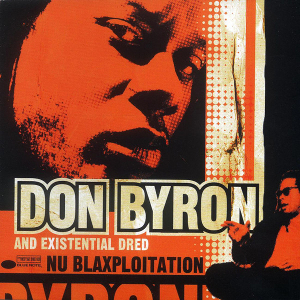Nu Blaxploitation
| Nu Blaxploitation | ||||
|---|---|---|---|---|
 | ||||
| Studio album by | ||||
| Released | 1998 | |||
| Genre | Funk, jazz, hip hop[1] | |||
| Label | Blue Note[2] | |||
| Producer | Don Byron | |||
| Don Byron chronology | ||||
| ||||
Nu Blaxploitation is an album by the American musician Don Byron, released in 1998.[3][4] Byron is credited with his band Existential Dred.[5] Byron supported the album with a North American tour.[6]
Production[edit]
The album was recorded in December 1997 and January 1998.[7] The poet Sadiq Bey performed on many of the tracks.[8] Biz Markie contributed rap verses to "Schizo Man".[5] Reggie Washington played bass; Uri Caine played piano.[9]
"Blinky" is about the abuse of Abner Louima by the NYPD.[10] "If 6 Was 9" is a cover of the Jimi Hendrix song; it contains a passage from the Turtles' "Happy Together".[11][12] Byron covered a couple of Mandrill songs; the band was one of Byron's childhood favorites.[13] "Dodi" references Dodi Fayed, while "Furman" references racist cop Mark Fuhrman.[14][15] "Domino Theories" was inspired by the work of political scientist Andrew Hacker.[7]
Critical reception[edit]
| Review scores | |
|---|---|
| Source | Rating |
| AllMusic | |
| Robert Christgau | |
| The Encyclopedia of Popular Music | |
| Los Angeles Daily News | |
| The Penguin Guide to Jazz on CD | |
Time called the album "overtly political funk and rap" full of "dark, fertile electric grooves."[19] The Chicago Reader deemed it "an incisive collection of loose-limbed funk, acerbic spoken word."[10] Stereo Review considered Nu Blaxploitation "a mix of old-school groove, social protest, and surrealistic asides—just the kind of ambitious sprawl you'd expect from someone who dedicates his album to both Latin/funk purveyors Mandrill and classical composer Arnold Schoenberg (among others)."[20]
Jazziz wrote that the album "unfolds like a series of existential concerns set to a backbeat—a churlish, unapologetic bit of brilliance that vamps, grooves, strolls, and riffs on several levels at once."[21] Newsday labeled it "a one-of-a-kind testimony on what it's like to be a caring, daring African-American intellectual-bohemian at the tail end of the 20th Century."[22] The Washington Post stated that "Byron has writer Sadiq tiresomely spell out his points with words that recall the sophomoric scribblings of punk poet Henry Rollins."[23]
AllMusic praised the "somber, chamber jazz arrangements and a bevy of funky, swinging charts."[16]
Track listing[edit]
| No. | Title | Length |
|---|---|---|
| 1. | "Alien" | |
| 2. | "Domino Theories – Part I" | |
| 3. | "Blinky" | |
| 4. | "Mango Meat" | |
| 5. | "Interview" | |
| 6. | "Schizo Man" | |
| 7. | "Dodi" | |
| 8. | "I'm Stuck" | |
| 9. | "I Cannot Commit" | |
| 10. | "Fencewalk" | |
| 11. | "Hagalo" | |
| 12. | "Domino Theories – Part II" | |
| 13. | "If 6 Was 9" | |
| 14. | "Furman" |
References[edit]
- ^ Nicholson, Stuart (May 1, 2014). "Is Jazz Dead?: Or Has It Moved to a New Address". Routledge – via Google Books.
- ^ Wilonsky, Robert. "Don Byron". Dallas Observer.
- ^ "Don Byron Biography, Songs, & Albums". AllMusic.
- ^ Murph, John (July 24, 1998). "Clarinet as Bullhorn". Washington City Paper.
- ^ a b Mnookin, Seth (March 17, 1999). "Don Byron and Existential Dred". Salon.
- ^ Renner, Michael J. (11 Dec 1998). "Jazz Clarinetist Weaves Musical Ideas and Social Conscience". St. Louis Post-Dispatch. p. E4.
- ^ a b c The Penguin Guide to Jazz on CD. Penguin Books Ltd. 2000. p. 109.
- ^ Longley, Martin (5 June 1998). "Poetry with funk floats X-Dred's boat". Birmingham Post. p. 15.
- ^ Johnson, Phil (14 June 1998). "Jazz: Existential dread? Existential joy!". Features. The Independent. p. 10.
- ^ a b "Don Byron & Existential Dred". Chicago Reader. September 17, 1998.
- ^ Firestone, David (24 Mar 1998). "Learning Jazz Through Byron's Poetic Mix". The New York Times. p. B2.
- ^ Roberts, Randall (Sep 1998). "Reviews". CMJ New Music Monthly (61): 47.
- ^ Norris, Chris (16 June 1998). "Keeping it spiel". The Village Voice. 43 (24): 70.
- ^ "Don Byron Brings In The 'Nu'". Los Angeles Sentinel. 2 July 1998. p. B5.
- ^ a b Shuster, Fred (24 July 1998). "Sound Check". Los Angeles Daily News. p. L23.
- ^ a b "Don Byron - Nu Blaxploitation Album Reviews, Songs & More | AllMusic" – via www.allmusic.com.
- ^ "Robert Christgau: CG: Don Byron". www.robertchristgau.com.
- ^ Larkin, Colin (2006). The Encyclopedia of Popular Music. Vol. 2. MUZE. p. 109.
- ^ Handy, Bruce (October 12, 1998). "Music: Don't Call It Fusion". Time.
- ^ Walls, Richard C. (Oct 1998). "Return of the Headhunters / Nu Blaxploitation". Stereo Review. 63 (10): 94.
- ^ Palmer, Don (Aug 1998). "Don Byron and Existential Dred: Nu Blaxploitation". Jazziz. 15 (8): 64.
- ^ Seymour, Gene (30 Aug 1998). "On the Record". Newsday. p. D26.
- ^ Porter, Christopher (4 Oct 1998). "Jazz That's 'Nu' But Unimproved". The Washington Post. p. G2.